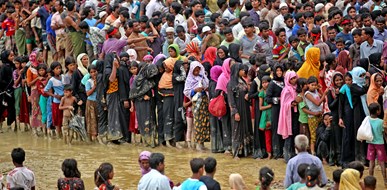[Interview] Aung San Suu Kyi to defend Myanmar before the ICJ in Gambia’s Rohingya genocide case
Published 10 December 2019
Rohingya Muslim people, who crossed over from Myanmar into Bangladesh, wait for their turn to collect food aid near Kutupalong refugee camp, Bangladesh ©Shutterstock.
On December 11 Nobel peace prize laureate and Myanmar’s leader Aung San Suu Kyi defended Myanmar in an extraordinary case at the International Court of Justice in The Hague. Suu Kyi led the legal defence team of her country against charges of genocide against the Buddhist state's minority Rohingya Muslims. In an interview with Asser researcher Dr Dimitri Van Den Meerssche on the case, Van Den Meerssche stated: “The claim by The Gambia does not merely seek to confirm that genocide has been committed, but, more importantly, it calls for an immediate halt to ongoing violations.”
Most disputes before the ICJ are of a bilateral nature. How does the case brought by Gambia (a West African nation) differ and is it unusual in terms of the court's established jurisprudence?
Dimitri Van Den Meerssche: “This is unusual, indeed, but it is not contrary to the court's established jurisprudence. The reason why most disputes before the ICJ are bilateral is that states need to display a "legal interest" when bringing a case. This generally implies that state A needs to be somehow affected by the (in)action of state B. Yet, the ICJ has firmly established that the norm prohibiting genocide is a jus cogens norm with an erga omnes character. Phrased more simply: the prohibition  against genocide is so vital that all states are considered to have a legal interest in the matter. In bringing its claim, The Gambia invokes not only the rights of the Rohingya under the Genocide Convention but also its own rights erga omnes (partes). In short: while it rather rare to see cases of this nature, this is not contrary to the jurisprudence of the court. The court has already long established (since 1970) that certain violations of international law are so grave that they are considered to affect the whole international community of states. The crime of genocide undoubtedly falls under this category of violations (as recently affirmed by the court).”
against genocide is so vital that all states are considered to have a legal interest in the matter. In bringing its claim, The Gambia invokes not only the rights of the Rohingya under the Genocide Convention but also its own rights erga omnes (partes). In short: while it rather rare to see cases of this nature, this is not contrary to the jurisprudence of the court. The court has already long established (since 1970) that certain violations of international law are so grave that they are considered to affect the whole international community of states. The crime of genocide undoubtedly falls under this category of violations (as recently affirmed by the court).”
Aung San Suu Kyi said she will personally lead the defence team -- is that unusual that a civilian leader of a country personally will lead a team before the ICJ?
“This is indeed unusual, although we recently also saw Evo Morales (Bolivian President at the time) in The Hague for the Bolivia v. Chile case. It is still to be seen what her role as leader of the delegation entails. I expect that she will act as Myanmar's agent and make a political plea in the public hearings before leaving the argumentation to selected counsel. It is, of course, significant to have Aung San Suu Kyi leading this team. It will be a very public and high profile confrontation and will urge her to explicitly defend her country's actions against the Rohingya.”
Do you know of any case before where this has happened?
“I can only think of two cases. First, there was the presence of Evo Morales in Bolivia v. Chile. Second, there was the remarkable presence of Iranian Prime Minister Mohammad Mossadegh, who pled before the ICJ in the Anglo-Iranian Oil Co. Case (1952) before his government was overthrown in 1953.”
Is this the third time that a genocide case based on the convention is brought before the ICJ -- the first being Bosnia and Herzegovina vs Serbia, and the second being Montenegro and Croatia vs Serbia. Is that correct?
“This is indeed correct. Importantly, if the ICJ decides to judge the case, it will be the very first time that a genocide case is investigated by the court without relying on the findings of other courts. In the two other cases you mention, this was the ICTY.”
What does that say about the application of the Convention on the Prevention and Punishment of the Crime of Genocide? In other words, it seems it is a convention seldom invoked before the court. Would you agree?
“This is remarkable, indeed, especially considering the various atrocities that could have been brought under the substantive ambit of the convention since its entering into effect. I see a variety of reason for this. First, the crime of genocide does not always unfold as an inter-state dispute (you could say it quite rarely does). Second, there are, of course, a range of other judicial venues where these claims can be brought. Considering that these are specifically built to address war crimes, crimes against humanity and/or genocide, they might be the preferred venue. I am thinking of the ICTR (Rwanda), Khmer Rouge Tribunal (Cambodia), ICTY (Yugoslavia) etc. It is important to note in this context that on 14 November, the pre-trial chamber of the International Criminal Court (ICC) has also given the prosecutor the green light start a formal investigation on the violence against the Rohingya. The most important reason why the ICJ has rarely considered the crime of genocide might lie in this presence of alternative - perhaps more suitable - venues. Third, the convention places a rather high threshold for the qualification of what constitutes genocide.
In short: I agree that the genocide convention is seldom invoked before the court, and I think this can be explained by the (often intra-state) nature of the crime, the presence of alternative judicial venues and the substantive thresholds in the convention. However, the number of cases before the ICJ might not be the most telling indicator to measure the impact of the convention - exactly because of the numerous alternative venues.”
Are there any other observations you have in regards to this case that may be of interest?
“Considering the difficulties faced by the ICC to effectively address the crimes committed against the Rohingya people, the ICJ seems to be the most promising venue to establish the responsibility of the government of Myanmar and to provide some answers to the loud call for justice and accountability.
It is also crucial to note that the current proceedings involve a demand for provisional measures. This means that the claim by The Gambia does not merely seek to confirm that the crime of genocide has been committed but, more importantly, to call for an immediate halt to ongoing violations.”
Further reading
Asser researcher Dr Dimitri Van Den Meerssche has been quoted in the following two articles:
- Aung San Suu Kyi Appelée à <cesser le génocide rohingya> au Myanmar
- Five questions on the ICJ and genocide
Asser researcher Dr Dimitri Van Den Meerssche is part of the Asser research strand on Adequate Dispute Settlement and Adjudication in International and European Law. This research strand is organised around inquiry into attributes of trustworthy dispute settlement in international adjudication.
